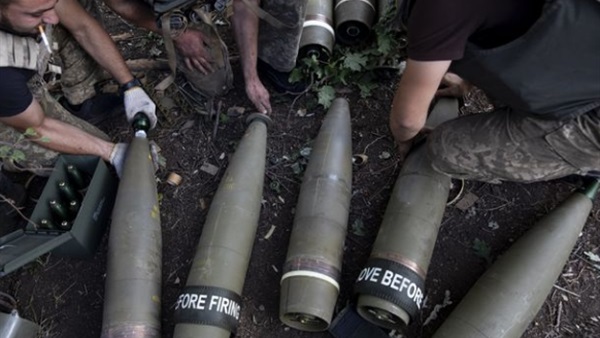South Korea to Sell Arms to U.S. for Ukrainian Forces Fighting Russia

South Korea
will for the first time sell artillery shells destined for Ukrainian forces
through a confidential arms deal between Seoul and Washington, a move that
reflects a global scramble for munitions after months of war with Russia.
U.S. officials
familiar with the deal said that the U.S. will purchase 100,000 rounds of 155mm
artillery ammunition that will be delivered to Ukraine, enough to supply
Ukraine’s artillery units for at least several weeks of intensive combat.
Routing the
deal through the U.S. allows South Korea to stick to the letter of its public
commitment not to send lethal military support to Ukraine while assisting
Washington, Seoul’s paramount ally in deterring North Korea.
The South
Korea-provided arms will enable the U.S. to supply the Ukrainians without
digging deeper into the American inventory of artillery rounds, which U.S.
officials have acknowledged are dwindling quickly. In August, the stockpile of
U.S. 155mm artillery rounds had fallen to levels that concerned the Pentagon as
Ukraine engaged in fierce artillery duels with the Russian forces, and U.S.
officials say the situation is considerably worse now.
South Korea
Defense Minister Lee Jong-sup met with Defense Secretary Lloyd Austin earlier
this month and agreed in principle to proceed with the artillery deal.
The Defense
Ministry in Seoul said in a statement that a South Korean company is in talks
with the U.S. to supplement America’s stockpile of 155mm artillery shells. The
South Korean government’s position of not supplying lethal weapons to Ukraine
remains unchanged, according to the statement.
“The
negotiations are happening under the premise that the U.S. will be the final
user,” the statement added
The White
House recently said North Korea was providing artillery shells for Russia,
setting the unusual stage for armaments from the two Asian countries to be used
by opposing forces in Europe. The arms deals highlight the limits of industrial
bases in the U.S. and Russia, which have been stretched to the limit during the
war in Ukraine.
A Pentagon
spokesman said the U.S. has been in discussions with the South Korean
industrial base for the ammunition.
“Any
potential sales or transfers of equipment are always closely evaluated against
current and future U.S. and ROK military readiness requirements on the
peninsula, and will not detract from our defensive posture or readiness to
respond against regional threats,” said Lt. Col. Marty Meiners, a Defense
Department spokesman, using an abbreviation for the Republic of Korea, South
Korea’s formal name.
Earlier this
month, the U.S. sent a shipment of American artillery shells from its
stockpiles in South Korea, a transfer that hasn’t been previously reported or
acknowledged by the Defense Department.
“United States Forces Korea has been requested
to support this effort by providing some of its equipment,” Col. Isaac Taylor,
a spokesman for the U.S. command in South Korea, said in a statement on the
previous shipment. “This has zero impact on our operations and our ability to
execute on our ironclad commitment to the defense of our ally, the Republic of
Korea.”
U.S. officials
say that South Korea’s provision of its own artillery for Ukraine won’t
undermine military readiness, even as tensions with North Korea intensify.
While North Korea has enormous stockpiles of artillery ammunition, military
experts say that South Korea has a range of systems to respond to the threat,
including its own rocket force.
“South
Korea’s advancing missile force, but more generally its defense modernization
and increasing defense industry capacity, may be providing it options to supply
arms to Europe and other partners,” said S. Paul Choi, a defense expert at the
Rand Corp., a nonpartisan think tank.
Poland has
signed contracts with South Korea worth $5.8 billion to buy tanks, howitzers
and rocket launchers. Those will make it easier for Warsaw to send weapons to
Ukraine without putting itself at risk.
Meanwhile,
Russia has turned to North Korea for artillery shells, which are being sent
through indirect routes that include shipments through third countries in the
Middle East and North Africa, the Biden administration said recently.
White House
National Security Council spokesman John Kirby said that while the U.S. has had
indications for some time that Russia had requested artillery shells from North
Korea, the administration now has information that shipments have been sent.
“It’s a
significant number of artillery shells,” Mr. Kirby told reporters. “We’re still
monitoring this to determine if the shipments have been actually received.”
North Korea
has denied that it is sending the munitions
Russian
President Vladimir Putin warned last month that South Korea would destroy
relations with Moscow if it sends weapons and ammunition to Ukraine.
South Korea
has provided bulletproof vests, helmets and medical supplies to Ukraine but
hasn’t provided lethal arms.
“We’ve
provided humanitarian and peaceful assistance to Ukraine in solidarity with the
international community but never lethal weapons or any such things,” South
Korea President Yoon Suk-yeol said last month, stressing the desire for good
relations with Russia.
Tensions
have soared on the Korean Peninsula in recent weeks as North Korea has
conducted a series of aggressive missile tests and South Korea and the U.S.
have extended a joint air exercise that involves 240 aircraft.
At a press
conference earlier this month, Mr. Austin and his South Korea counterpart said
that their countries would return to large-scale field exercises next year.







